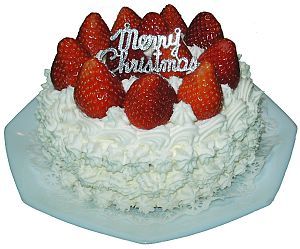WITLife #8 – Christmas Cakes and Monolingual Nobel Prize Winners
 WITLife is a periodic series written by professional Interpreter/Translator/Writer Stacy Smith (Kumamoto-ken, 2000-03).
WITLife is a periodic series written by professional Interpreter/Translator/Writer Stacy Smith (Kumamoto-ken, 2000-03).
My posts from last week were largely doom and gloom about the current economic woes, so I thought I’d start this week with something lighter from recent Japanese TV news—the topic of Christmas cake! Definitely a big deal in Japan.
(For those unfamiliar, Japanese Christmas focused primarily on Christmas Eve. The actual holiday is a regular workday, to the dismay of many an English teacher. It is a secular celebration where couples and families get together to eat typical Christmas fare such as Kentucky fried chicken and strawberry shortcake.)
The TV news this past Friday profiled the major department store Matsuya in Ginza, which sells 25 million cakes during the three day period from the 23rd until Christmas. The cakes that are selected to be featured in its seasonal catalog basically determine how the year’s profits will turn out.
An essential part of the selection process are the taste-testers who decide on certain ingredients. This year’s hot commodity was “Ginza honey,” a special type of this sweet substance that would be incorporated into a cheesecake. For this recipe, in order to stay within budget they had to find a balance between using cheap, domestic ingredients and more expensive ones such as French cheese.
Once the cheesecake was completed, it was evaluated along with eight other entrants based on their design and taste by some of Matsuya’s full-time female workers. (Are male pallets not sensitive enough, or does this speak to the Japanese bias that men don’t enjoy sweets?) The competition was intense, but you’ll be glad to know that “Ginza Honey Cake” made the cut to be part of the Christmas catalog.
(A quick FYI: Japanese supermarkets here in NYC are currently taking orders for Christmas cake should you desire to have your own Japanese-style celebration here in the States…)
- In other uplifting news, three recipients of this year’s Nobel Peace Prize for Physics were Japanese. Toshihide Masukawa caused a bit of controversy by refusing to give his speech at the Stockholm awards ceremony in English as is tradition. He had never traveled abroad before and reportedly had to have a passport made for the occasion! His prize-winning thesis had been translated into English by fellow Nobel laureate Makoto Kobayashi, who had previously attended all overseas occasions in Masukawa’s place. The third winner was Japan-born University of Chicago Professor Yoichiro Nambu.
- One Chinese character is selected annually by the Kyoto-based Japan Kanji Ability Certification Association to reflect the social situation of the past year. On December 12th, the kanji of 2008 was determined to be 変 (hen), or “change”, which could be read in multiple ways. Some of the leading interpretations were the changing of Japanese prime ministers, the change Obama represents, the major upheaval in the world’s economy, as well as perhaps most importantly the desire for change in the upcoming year.


Comments are closed.